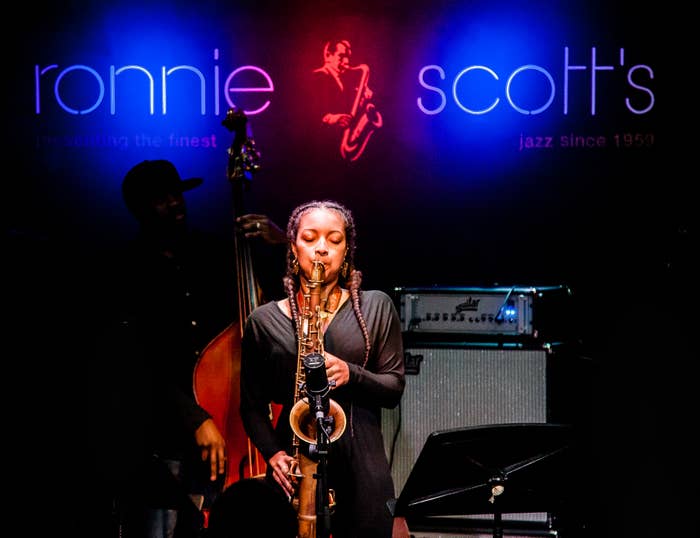
Lights low, even at midday, and the aura of last night’s performances lingers as I find myself situated in the pit of Ronnie Scott’s Jazz Club with Nick Lewis, Head of Music and Promotions. Even as the maintenance teams prepare for the next evening show, we pull up two chairs and sit right next to the stage. This stage has held residence to countless legends too, such as Miles Davis, Nina Simone, and even Prince.
The name Ronnie Scott’s has resonated throughout the jazz scene globally, and has been a milestone performance for any artist — burgeoning or established. However, the illustrious history of the venue wasn’t the focus of our conversation today: I was here to get a perspective from the top of the food chain about the rise of British jazz.
The world of jazz is changing, and to keep up with these tumultuous changes is no easy task, so I sat down with Nick to see what he thought about it. Once asked about the process of booking someone to play, Nick briefly tells me how Ronnie Scott’s has transitioned over the last decade amidst the closure of countless London venues, and the legacy that it seeks to maintain. “I’m a bit mischievous, in that I like testing the boundaries of what a traditional jazz club should be doing,” Nick says, echoing the attitudes within today’s movement. Complex gets the lowdown.
Complex: The rep that Ronnie Scott’s has out there goes beyond the building itself. How do you go about booking the talent at such a prestigious venue?
Nick Lewis: It’s an iconic brand, for sure. And everyone who works here, none of us take that lightly—it’s quite a responsibility. To answer your question, it’s thinking about how to really stay true to that legacy. What I always think of is how would Ronnie feel about this? He was a guy that was very true to music and art, so we do have a duty to put on the legends. We should never stop trying to book all the legends that have been playing here for thirty, forty years, but we also have a duty to make sure we are putting through all the young talent too.
Over the past five, ten years, would you say there’s been a change in the sounds that people play at the venue?
Absolutely. Well, it’s an interesting one: I think that there’s maybe a crop of musicians now that are starting to make headway, certainly in the last few years, and they’re starting to get real press. They’re getting written about in Rolling Stone and they’re playing at SXSW festival and Coachella—it’s going beyond a little London bubble but, actually, there’s been great music for the last 10-15 years, it’s just that everyone’s finally woken up to it.
What do you feel about this new explosion of talent we’re seeing rise up in the jazz scene of late?
I think it’s fantastic. It’s exciting! This crop of young musicians, it’s just dope music. You don’t have to overthink it, just use your ears—it’s great music. One of the most inspiring things about these young players is the confidence that they have, and the way that they mix modern influences with their jazz—it comes from jazz DNA. They’re mixing sounds that they’ve grown up with so they’re mixing hip-hop, grime, Afrobeats, neo-soul—all these influences come through because that’s what they grew up on. They didn’t grow up on “Take The A Train”, a parallel that Robert Glasper talks about. Obviously, I acknowledge the heritage and the lineage but, actually, jazz is an art form. That’s what is so exciting about it, and what’s connecting with this next generation: it’s always evolving and it’s a living, breathing art form.
So, do you think, to move forward, jazz needs to be driven by these younger artists?
That’s a good question. I think jazz has a history. If you think of artists such as Miles [Davis], even other American artists like Harvey Mason and Kenny Garrett, these guys are now in their fifties and sixties, but they always bring young musicians with them, and there’s a history of that. Miles was always looking for that 17-year-old kid that could teach him, because jazz is a learning thing between the generations, right? So, when Harvey Mason came here in 2014, he brought Kamasi Washington. He wasn’t Kamasi then—he was just a sax player, and no one had heard of him—but I remember clocking that and going “Wow! Who is this guy?” I suppose that answers your question. It’s a dialogue, a duality between the elder statesmen and the younger guys. I think they both learn off each other, which is really healthy. So Nubya Garcia is now hooking up with Pharaoh Sanders and Shabaka [Hutchings] is doing gigs with Kamasi [Washington]—they’re learning off each other’s scenes. It’s not even always an age thing; one could be from LA and the other from peckham, but they’ve got stuff in common and can really learn from each other.
We shouldn’t ever get complacent and think that it’s totally healthy, but—in terms of the musicians—I know that jazz is in a brilliant place, artistically.
And they’re appreciative and learning of the history. Unfortunately, however, I still think that jazz is a generally underappreciated genre. What would you say to those who still see it as quite an elitist music?
Well, I don’t think it is underappreciated. I had a meeting with DICE and they were telling me that jazz is their third most popular genre, so how mind-blowing is that? However, there are barriers to break down. We shouldn’t ever get complacent and think that it’s totally healthy, but—in terms of the musicians—I know that jazz is in a brilliant place, artistically. What’s really exciting about those guys especially, is that they don’t see boundaries in terms of venues or ages, or cultures, or different races of the audiences—it’s just a real melting pot, and I think they see that. These artists will come and play Ronnie’s and then play a warehouse in East London. They’ll go and play Afropunk, but then they’ll go and play North Sea Jazz, which is quite a traditional festival, or they’ll go and play Love Supreme, which is a bit in between.
I think there are some really good places in South London for jazz.
Yeah, well there was Ghost Notes, but that’s suddenly closing and there’s some other spots. Where else do you recommend?
Hackney Empire in East. The jazz nights there are really great.
There’s Giant Steps in East as well, which is getting good reviews. But the whole elitist thing, I don’t know. It’s a difficult one. Ronnie Scott’s, as a venue, is very unique. It’s quite out on its own in that we can play different cards; for instance, this week, we booked Booker T. Jones—a legendary artist from the ‘60s—who is coming here and playing his hits, and he’s been playing for fifty years. He’s playing all week, but then we can do a late show, with another type of artist, and they’ll bring a bunch of 20-year-olds who are hanging out till 3am.
I know you’ve put on Ezra Collective, Moses Boyd, Nubya Garcia in the past—do you feel like the atmosphere has changed because of them?
I think it’s very artist-led. So, come to an Ezra gig... I mean, Femi [Koleoso, drummer] is doing a masterclass for us and he really wants to give back, even though he’s a busy guy—playing with Jorja Smith—but he wants to give back to the community, so he’s doing one-on-one workshop lessons with kids who are from, perhaps, less privileged backgrounds. Guys like him are an inspiration because they’re showing that it’s for everyone, right? He’s opening it up to the new generation; he wants to inspire kids who might think that it’s out of their reach. The other difficulty, of course, is that music instruments aren’t cheap. A saxophone is £3,000, a decent drum kit is over £500, so it’s out of reach for a lot of people. We have our own charity, and we’re actually doing an instrument amnesty this summer, collecting instruments that people don’t use and then giving them to kids. This is the stuff that Ronnie’s should be doing because we’re in a good position to do so. We should be doing stuff like that.
I know that there are the late shows for students, and Ronnie’s upstairs, but do you see younger audiences coming to the main shows?
Again, it’s artist-led. So Booker T.’s crowd is going to be mostly older because they’re the guys that grew up with his music, but in a week’s time, I’ve got a headline: Sarah Tandy, and that show will have Femi on drums as well as Binker Golding. Anyway, so them and then a young singer called Cherise Adams-Burnett—a real rising star, in my view—she plays with SEED Ensemble and Ashley Henry. That gig will be full of millennials, but you’re not going to see many tonight because it’s Booker T., so it is very artist-led.
I would label these artists right now as quite revolutionary in the direction they’re taking jazz. Can you see any parallels between the revolutionary artists of before and those now?
I think the new guys are really are forging their own sound. They’re taking inspiration from the past, but making their own, unique sound. It’s all down to everything though, even the aesthetic, the way they dress—they’re dressing how they’d normally dress, if that makes sense? You can see them down the pub, and that’s their uniform. It’s not like they’re getting suited and booted and you’re like, “Ah, this is a bit of a compromise.”
It’s true to who they are.
It’s true to who they are, and that’s what’s appealing, right? As an audience member, you would want the artist to be who they are. That’s what’s so cool about it.
At the moment, jazz is taking all sorts of turns, so where would you see it going in the next five years?
I interview a lot of these guys, and I ask them that question and they’re like: “Well, I don’t really know.” But the thing that’s encouraging about these guys is that they are way, many steps ahead. They’re not resting on their laurels. You ask Shabaka Hutchings or Theon Cross about this; they’re already preparing for when the hype dies down. Moses Boyd decided to be a drummer when he was, like, 15 years old, and he was playing avant-garde jazz in a drum and sax duo [Binker & Moses], so this guy isn’t about fame and money. I’d say another big catalyst was the Field Day festival last year, where they booked all of these guys. Erykah Badu headlined, but all the young jazzers performed and that was the best one-day festival ever! It really put it on the map. Where is it in five years? Hopefully it’s going to continue going. You can already see the trajectory where these artists who I was booking at Ronnie’s or the Jazz Café two years ago are now filling the Village Underground. Ezra Collective is a band that you just name-checked. I can plot the trajectory for you: they did a support at Ronnie’s two years ago, then I did them a headline here, then did Islington Assembly Hall, which was 800 people. Then they did KOKO back in November, 1500 people, and we’re gonna do Roundhouse with them this year, which is 3000 people. And they’ll fill that. Kamasi Washington is filling the Brixton Academy... I actually think our London scene is as exciting as the LA scene, or more.
I would definitely agree. Now, I know we’ve talked a lot about London, but do you know anything outside of London jazz? Is there anything happening in Manchester or Nottingham, for example, that you’re a fan of?
Yeah, definitely. I try and keep tabs on as much stuff as possible. Spotify is great way—I resent the algorithms, but I appreciate them at the same time, because you discover new stuff.
You know what you’re getting yourself into.
Exactly, and the Manchester scene is really healthy. I’m a big fan of Gogo Penguin and all those guys, Mammal Hands—all that stuff! There’s a great keyboard player from Leeds, called Dan Goldman, who I try and bring down from time to time. It’s trying not to be so London-centric, but it is more convenient to musicians to roll out of bed and get here.

